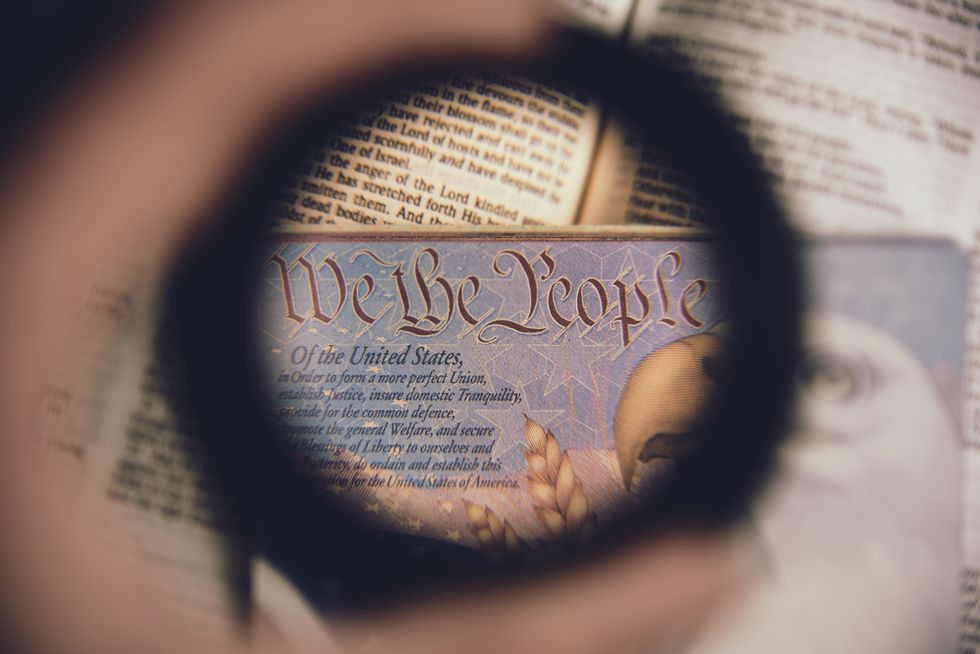The prevalence of conspiracy theories in today's society has been extremely entertaining to me. Since I am a very curious person by nature, I love researching and learning more about theories that people created to explain seemingly normal events. I've watched flat earth documentaries, researched government projects such as MK Ultra and Area 51, and watched all of the Shane Dawson YouTube videos regarding conspiracy theories. Interesting as they may seem, when conspiracy theories and ungrounded claims begin to undermine politics, it can be dangerous and detrimental to our society. Therefore, I believe it's important to address why conspiracy theories arise, especially in politics.
I took about a course about Media and Politics at James Madison University this past year and studied the book Mass Media and American Politics by Doris Graber and Johanna Dunaway. They identified many reasons why people are attracted to conspiracy theories and willing to believe the theories they hear, even from less-than-credible sources. First, the lack of information about an important event or place causes people to speculate or to make up information. This, mixed with the general distrust of government that many people have, can result in people accusing the government of lying or suppressing information. Second, conspiracy theories are also popular because fantasy can act as an escape mechanism for stress. People enjoy making up or choosing to believe stories that seem ridiculous simply because it is fun and stress-relieving to believe in something. Additionally, intellectual vanity or pride can cause people to stick more adamantly to their beliefs even when they are told contradicting information. Similarly, groupthink with confirmation bias means that we are more likely to believe information a lot of other people believe on the basis that other people agree with us and because we seek out information that agrees with our preconceived opinions and bias. The "Burden of Proof Fallacy," which claims that something must be true if it can't be disproven, also supports a number of groundless conspiracy theories because it is not true that every ridiculous scenario can be disproven easily. Finally, we humans like patterns over randomness and we want to believe there is a motive or intention behind actions or events. For example, when a major tragedy strikes, it is hard for us to understand how something so terrible could happen so randomly. People want to find motives behind events that are simply tragic, and they want to shift blame when it does not agree with their beliefs.
Gun violence is a clear example of a political issue that has many conspiracy theories around it. As I wrote in a previous article about hateful rhetoric, far-right TV personality and conspiracy theorist Alex Jones was popular for claiming that the parents of the victims from the Sandyhook Elementary School Shooting were paid actors. Despite this claim being completely ridiculous and having no evidence to support it, many people chose, and still choose, to believe that the school shooting was fake due to groupthink and because people want to find patterns and meaning in things instead of accepting tragedy.
The most recent unsupported conspiracy theory that has gone viral is that the Clintons were involved in the death of Jeffrey Epstein. Jeffrey Epstein was a convicted sex offender who had connections to many politicians, including but not limited to Donald Trump and Bill Clinton. When President Trump was asked about whether he thought the Clintons were involved in Epstein's death, he chose to spread and encourage more conspiracy theories by saying he truly wasn't sure if the Clintons were involved and demanding a full investigation into the death—despite there being no evidence of any foul play. Now, the New York medicial examiner has ruled that Epstein's death was a "suicide by hanging," but the rumors and conspiracy theories surrounding his death still are circulating. While some are harmless comments meant to only point out how suspicious it is that a man who should have been on suicide watch was left alone long enough to kill himself, many are more serious and attempt to blame politicians for his death. Epstein himself lived a very public life yet there was speculation about how he made all of his money. His connections to important people such as the current president and former president Bill Clinton caused people to wonder whether such high-level officials could be involved in child sex-trafficking. Additionally, Epstein escaped punishment for his crimes for many years, most likely due to his high-level connections and his money.
Epstein's death provides the perfect scenario to create new conspiracy theories. It involves important government officials—which a lot of Americans do not trust—and there is little public information about it. However, it is important to recognize when conspiracy theories cross the threshold of being harmless and begin to undermine politics. The idea that the Clintons would be involved in the suicide of Epstein causes even more distrust of politicians and government despite no evidence suggesting that politicians were involved. Our current president's involvement with spreading and supporting the theory also gives legitimacy to this harmful rumor and undermines the very concept of evidence and truth. As Hanlon's Law states, never attribute to malice what can be explained by incompetence. Most likely, Epstein's suicide was due to incompetence or a mistake made by the prison authorities. Speculation and conspiracy theories into his death simply undermine democracy and cause unnecessary distrust of government.



 Going to the cinema alone is good for your mental health, says science
Going to the cinema alone is good for your mental health, says science












 women in street dancing
Photo by
women in street dancing
Photo by  man and woman standing in front of louver door
Photo by
man and woman standing in front of louver door
Photo by  man in black t-shirt holding coca cola bottle
Photo by
man in black t-shirt holding coca cola bottle
Photo by  red and white coca cola signage
Photo by
red and white coca cola signage
Photo by  man holding luggage photo
Photo by
man holding luggage photo
Photo by  topless boy in blue denim jeans riding red bicycle during daytime
Photo by
topless boy in blue denim jeans riding red bicycle during daytime
Photo by  trust spelled with wooden letter blocks on a table
Photo by
trust spelled with wooden letter blocks on a table
Photo by  Everyone is Welcome signage
Photo by
Everyone is Welcome signage
Photo by  man with cap and background with red and pink wall l
Photo by
man with cap and background with red and pink wall l
Photo by  difficult roads lead to beautiful destinations desk decor
Photo by
difficult roads lead to beautiful destinations desk decor
Photo by  photography of woman pointing her finger near an man
Photo by
photography of woman pointing her finger near an man
Photo by  closeup photography of woman smiling
Photo by
closeup photography of woman smiling
Photo by  a man doing a trick on a skateboard
Photo by
a man doing a trick on a skateboard
Photo by  two men
two men  running man on bridge
Photo by
running man on bridge
Photo by  orange white and black bag
Photo by
orange white and black bag
Photo by  girl sitting on gray rocks
Photo by
girl sitting on gray rocks
Photo by  assorted-color painted wall with painting materials
Photo by
assorted-color painted wall with painting materials
Photo by  three women sitting on brown wooden bench
Photo by
three women sitting on brown wooden bench
Photo by 
 Photo by
Photo by  Photo by
Photo by  Photo by
Photo by  Photo by
Photo by 


 people sitting on chair in front of computer
people sitting on chair in front of computer



 all stars lol GIF by Lifetime
all stars lol GIF by Lifetime two women talking while looking at laptop computerPhoto by
two women talking while looking at laptop computerPhoto by  shallow focus photography of two boys doing wacky facesPhoto by
shallow focus photography of two boys doing wacky facesPhoto by  happy birthday balloons with happy birthday textPhoto by
happy birthday balloons with happy birthday textPhoto by  itty-bitty living space." | The Genie shows Aladdin how… | Flickr
itty-bitty living space." | The Genie shows Aladdin how… | Flickr shallow focus photography of dog and catPhoto by
shallow focus photography of dog and catPhoto by  yellow Volkswagen van on roadPhoto by
yellow Volkswagen van on roadPhoto by  orange i have a crush on you neon light signagePhoto by
orange i have a crush on you neon light signagePhoto by  5 Tattoos Artist That Will Make You Want A Tattoo
5 Tattoos Artist That Will Make You Want A Tattoo woman biting pencil while sitting on chair in front of computer during daytimePhoto by
woman biting pencil while sitting on chair in front of computer during daytimePhoto by  a scrabbled wooden block spelling the word prizePhoto by
a scrabbled wooden block spelling the word prizePhoto by 








